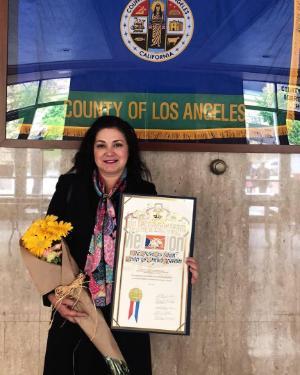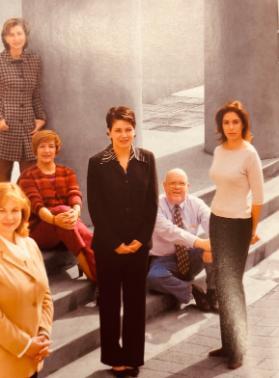
Sara Campos' Enduring Commitment to Justice and Service at the Loyola Center for Conflict Resolution
Sara Campos ’99 was a rising 3L when she did a work study program at Loyola Center for Conflict Resolution (LCCR) in 1998 and hasn’t left since.
Professor Bill Hobbs, co-founder of LCCR, saw her talent as a bilingual mediator and encouraged her to consider the opportunity. "He was one of the main reasons I was drawn to the clinic in the first place. It was such a great opportunity to get mediator training and mentorship from Bill. He was a DA for 30 years and was the one of the first mediator trainers in the late 80's, when mediation was a relatively new field. It was an amazing opportunity."
That summer in 1998, Sara resolved 12 cases and thanks to some additional funding in the new academic year, she was able to get a part-time job as a contract mediator. In 1999, after graduating from Loyola law school, Bill recruited her as a full-time staff at the Loyola Center for Conflict Resolution.
"The whole reason why I wanted to go to law school was to help people. And I feel like at the Loyola Center for Conflict Resolution, I get to do that every day," Campos says. "We help folks that have nowhere else to turn to. "
Many of the individuals LCCR serves are low income, monolingual Spanish-speakers who may not have access to the traditional justice system.
This year, LCCR celebrates its 30-year anniversary serving the community of Los Angeles and training LLS students. Founded in 1993 by Professor Bill Hobbs and associate director Marta Gallegos, the clinic opened its doors with the assistance of four student externs. Over the last 30 years, LCCR has evolved to include three distinct clinics: Dependency Court Mediation Assistance Clinic (DC-MAC), serving a population engaged in the family and child custody court system; a Collaborative Family Law Clinic (C-LAW), which uses a team of professionals to support families in meeting their needs and interests as they navigate divorce; and our original Conciliation and Mediation Clinic (C-MAC), supporting clients in revealing self-directed solutions to conflict.
LCCR is the oldest social justice law clinic at Loyola and offers bilingual (English/ Spanish) confidential mediation and conciliation and facilitation services for a wide range of disputes such as divorce cases, landlord-tenant cases, consumer-merchant cases, personal injury cases, and neighbor-to-neighbor cases, to name a few.
This means that LCCR clinic students get practical experience applying their problem-solving skills to a variety of real-life cases. "At LCCR, the clinic students are exposed to so many different types of cases,” says Campos. “But they apply the same deep listening and issue spotting skills. Even though we are not giving anyone legal advice, they are learning how to apply the laws to the facts and honing their negotiation skills.”
Thinking back on the last 25 years at LCCR, Sara Campos is grateful. "I never thought I would be here for 25 years,” she admits. “But my personal values align with the mission and vision of this law school. Being a lawyer for others and being of service to others is important to me, and I'm thankful that it's what I get to do every day.”

